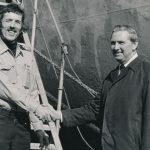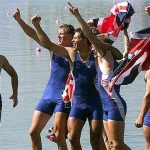Tonci Regjo has spent his life at sea, from attending Maritime High school and the Faculty of Maritime Studies, to working his way through every position possible to find himself in a highly sought-after job – pilot for the Split Harbour.
Tonci holds his Master of Ship of 3.000 GT+, he passed his Pilot exams in 2005, in 2010 he became the President of the Croatian Maritime Pilots Association and in 2011 he became a delegate in the European Maritime Pilots Association. In the last 12 years, he has been on all kinds of ships from 50 m – 320 m and he has completed more than 7,000 manoeuvres – more importantly, without any accidents.
For the last 7 years, Tonci was the president of the Croatia Maritime Pilots Association and only stepped down from this position in the last month to “let someone younger step in”. Tonci is also the GM of the Pilot Organisation in Split and from time-to-time, is an examiner for the Ministry of Maritime Affairs for Astronomical Navigation, Mate license and Master license.
Prior to becoming a Pilot, Tonci has worked all around the world on various ships; in 1992, he worked as an apprentice on multi-purpose and container ships, travelling to West Africa, United States and the likes…
I enjoyed this time, it was old school navigation, without GPS or radar. When I returned I decided to finish Maritime college because I knew a life at sea was what I wanted. I continued sailing and worked as 3rd-mate, 2nd-mate, Chief-mate… I worked on all kinds of ships, from dry cargo and container vessels to LNG Ships – where I finished my career.
“A life at sea is hard, you become a stranger to your children and wife…”
This kind of job was great while I was single, it didn’t bother me to be out at sea for 7-months, one year, but when I got married and had children, this became very difficult. Every time I would leave it was like someone cut my heart with a knife. My oldest daughter was in kindergarten at the time and the teachers always knew when I left, because she would become sullen and not want to play with the other kids… children know.
My father was also a Captain and my parents told me when I was young, my father came home one day (after a long stint away) and said ‘come here son, I’m your father’; I replied – ‘no, you are not my father’, I went to the room and brought back a photo of my father (as I knew him) and said – ‘see, this is my father’.

- Courtesy of Tonci Regjo; a much-loved photo of his father, Luka Regjo
That is hard. A life at sea is hard. You become a stranger to your children and after some time, even to your wife. I didn’t want this life for myself or my family, so I was very lucky to get the job as Split Harbour Pilot – it is one of the most sought-after jobs and there are only 6 positions.”
What is the most difficult situation you have been in?
A few times, I have been in very difficult situations, a few years ago, a passenger ship, around 260 m wanted to come into Split Harbour, but we had winds of 60 knots. We suggested it was too dangerous, but after some time, the Captain insisted – they had missed Venice and Dubrovnik due to bad weather and he was feeling the pressure from the guests and his company.

- Courtesy of Tonci Regjo
I went on board to explain the situation and eventually he said, he is coming into the harbour with or without me. I asked him his plan for entering the harbour and it was completely wrong, I suggested a new strategy – we entered the harbour in 40 knot winds and it was a very difficult manoeuvre. Somehow, we managed to come in OK, everyone was happy but I probably lost a few years of my life.
Another time a Military ship wanted to exit the military harbour. The entrance to the harbour is very narrow, there is shallow water all around and the ship had a draft of 11 m. Again, there were very strong winds, but the Captain refused to take a tug boat. He said he would manoeuvre by himself. He began and immediately started to drift towards the shore and shallow water (it was a very expensive ship and this could have been a major disaster) – in the moment he saw that he was in danger, he asked for my help. It was almost too late, but we just managed to come back to the barge and took the tug boat out – like I originally suggested…

The same thing happened with a Chinese Military Ship; it was the first time they were so far from China and their first time in Split. It was hard to communicate with them, only one guy spoke very limited English – this is part of the challenge of our job – communication. Once again, this Captain decided he was going to come in by himself without my advice and in the last moment he turned and asked for help; it was touch-and-go, but we managed.
I have no problem if people want to manoeuvre by themselves, the problems arise when they ask for my help in the last moment, it puts a lot of pressure on me and I need to make split-second decisions, that could have serious consequences.
Then there are times when the Captain doesn’t communicate ship issues with you – once, on-board a large cargo ship, I advised the Captain to slow down as we were approaching the harbour, nothing happened. I said “half astern”, nothing happened, when I finally asked if his engines were working, he said – ‘no’. I couldn’t believe he didn’t tell me that at the beginning! We had to immediately drop anchor so we didn’t crash straight into the pier.
What do you love most about being a pilot?
It is always interesting. Even if you are driving a similar sized ship into the same harbour, every day is different. You must always be ready. Every ship is unique, a lot of the ships are old, or they don’t have bow-thrusters, every ship moves differently – they veer to the left or the right and you need to adapt very quickly to ‘feel’ the boat. This is the most challenging and the most interesting part of the job.
As a pilot, sometimes you are manoeuvring a ship of 50 m and then a 210 m directly afterwards. It is a completely different feeling and you need to adapt quickly.
Embarking the ship is dangerous. We have a small pilot boat that taxis us to the ship, we need to climb up to the bridge on a pilot ladder – a rope ladder with wooden rungs. When the sea is rough, the ship is rolling around, the taxi is jerking up and down and the ladder is flying… this is actually a very dangerous part of the job. Every year, somewhere in the world, a pilot dies trying to climb the ladder. So, you need to be fit and forever alert – which means there is never a dull day.

- Courtesy of Tonci Regjo, climbing the pilot ladder
What does a typical day look like or how do shifts work?
We are ‘on’ for one week and shifts are 24 hours – don’t worry, we obviously aren’t awake the entire time or sitting waiting in an office, we get called when there is a manoeuvre. We have maybe maximum 5 – 6 manoeuvres per day, a manoeuvre takes around 30 mins to 2 hours, depending on the ship and where it is, i.e. getting to and from Kaštela takes longer. We have two pilots per shift and if for some reason the harbour is busy, then we will call in another pilot so everything goes smoothly and there are no delays.

- Courtesy of Tonci Regjo
What is the greatest lesson the sea has taught you?
I think every sailor or Captain will say – discipline first. But also, particularly in my role – to be calm in any situation. When everybody else panics, I am always calm – it drives my wife crazy sometimes. This trait is crucial at sea and as a pilot – if I panic on the ship, everybody else will panic and this is the worst possible scenario – because no one else can help me.
A century of seamanship…
I am from Split and my mother and father were from Split; however, our family name is from Dubrovnik, the oldest books we found with mention of our family name date back to the 17th Century. My Grandfather was a Captain from Dubrovnik and came to Split on a small passenger ship in the early 19th Century, my grandmother’s family owned a small tobacco shop in the port – my grandfather went to buy cigarettes and so began our family history in Split. So, my family has been at sea for more than 100 years. My son is now talking about it also, but honestly, I don’t really want that lifestyle for him, it is not easy.

- Courtesy of Tonci Regjo, Grandfather Luko Regjo
I love life at sea, but my family is the most important thing in my life
As I said, I loved working at sea, but being away from my family was no longer an option. I have four children from ages 4 – 20 years and I have been married to my wife Maja for 21 years – we met in 1992 before I went away on a ship, she wrote me letters, so when I returned we got together. They mean the world to me. When I was on board LNG Ships, I was earning a lot more money, but money can’t buy everything. Now I have a much better quality of life, I am based from Split, still at sea AND with my family every day. I feel very lucky.

- Courtesy of Tonci & Maja Regjo – their beautiful family
- Did you enjoy this story? Why not stop by our Total Croatia Sailing Page for more and like our Facebook Page










